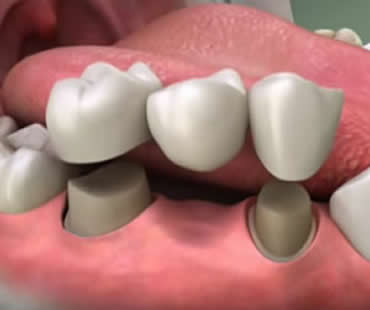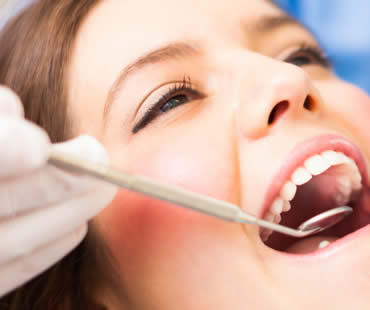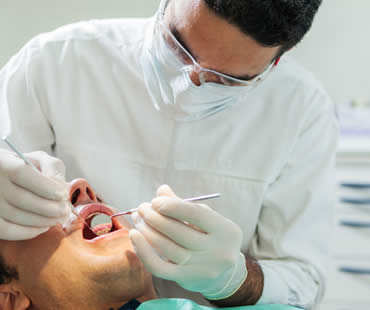
There are times when a tooth is so damaged from decay, trauma, or cracking that a filling isn’t the best choice. In these cases, a dental crown may be recommended for long-term tooth health. If a tooth is missing completely, your dentist may suggest a dental bridge to fill the gap between two bordering teeth.
Dental crowns, or “caps,” completely cover and protect your damaged tooth. It is bonded in place, giving you a stable, strong, and attractive alternative for your original tooth. Because it is customized for you using impressions your dentist makes of your teeth, it is a perfect match in size, shape, and position to your natural tooth.
Dental crowns can be the perfect solution to a severely damaged tooth. You won’t need to worry about pain, tooth stability, or your appearance when you choose a dental crown. Depending on what material is used, your crown can look as natural as your own tooth.
Dental bridges are designed to span a gap caused by a missing tooth. Having a gap in your smile can affect you in more ways than just cosmetics. Chewing and talking can become problematic as teeth adjacent to the gap begin to shift, leaving the potential for gum disease or jaw issues.
Dental bridges literally bridge the gap between two teeth. They are cemented onto the pair of teeth that border the empty space vacated by one or more missing teeth. The bordering teeth act as anchors for the bridge, and are trimmed down to hold a dental crown. Between the two crowns is a replacement tooth, customized for you by your dentist. Once the bridge is in place, you will regain the ability to smile freely while the bridge maintains the shape of your face and lips. You will speak more clearly and be able to eat a greater variety of foods. A dental crown also protects your healthy teeth from issues related to bite alignment.
Dental crowns and dental bridges are excellent choices for overall dental health, and can last a lifetime. To prevent damage to your dental work, avoid chewing things like ice or hard candy. It is also important to maintain regular dental checkups.
We offer dental crowns at our Meriden dental office

Gone are the days when chewing gum is considered poor etiquette. In today’s society, you can find people chewing gum in business meetings, church, and just about every other situation. With gum chewing so prevalent, you may have wondered what it’s doing to people’s teeth. You may be surprised to learn that research shows that chewing sugarless gum has a number of dental benefits. Let’s see how it can actually be a helpful addition to your oral care routine.
Saliva flow
Chewing sugarless gum increases the flow of saliva in your mouth, which rinses away food particles. Saliva also neutralizes acids that result from bacteria in your mouth that can lead to tooth decay. Known to carry with it calcium and phosphate, increased saliva flow also helps strengthen your tooth enamel.
ADA acceptance
Choose gum with the American Dental Association (ADA) Seal, indicating it as met the required safety and effectiveness criteria. This approval means that you can trust the gum’s packaging and labeling to be true.
Sugarless
The only gums carrying the ADA Seal are sugarless. They contain sweeteners that don’t cause cavities, like aspartame, mannitol, sorbitol, or xylitol. Chewing gum with xylitol is especially recommended, because it has been shown to combat tooth decay and cavities.
Dental hygiene
Even though chewing gum can be beneficial, remember that brushing and flossing are still the best ways to care for your teeth. Brush twice a day with fluoride toothpaste, and floss every day to remove plaque and debris between your teeth. Between these dental hygiene tasks, however, it is acceptable to chew sugarless gum to continue caring for your mouth during the day.
If you live in the Meriden area contact us today

Severely damaged, injured or diseased teeth can lead to not only cosmetic problems with your smile, but also functional ones. Your dentist may recommend dental crowns or dental bridges to treat your dental issues.
Dental crowns are a restorative dental therapy that covers the affected tooth completely, serving as the new outer surface of the tooth. A dental crown maintains the natural roots of a tooth and can prevent extraction. A dental bridge fills the gap left by one or more missing teeth and is affixed to bordering teeth with an anchoring crown.
Both dental crowns and dental bridges are made from a variety of materials that can be designed to match the color of your surrounding natural teeth. As opposed to removable prosthodontics such as full or partial dentures, dental crowns and bridges are permanently bonded to existing teeth or dental implants, allowing them to function and appear as natural teeth.
Dental crowns and bridges have a number of advantages and benefits, such as:
- Dental crowns protect the natural tooth after a root canal therapy, helping to prevent bacteria re-infecting the tooth that could lead to extraction.
- Dental bridges restore gapped or missing teeth, providing support to the surrounding teeth, preventing them from shifting in to fill the empty space and affecting your speech, bite and smile.
- Your dentist can typically place dental crowns and bridges in as few as two appointments.
- Dental crowns and bridges are both long-lasting, durable therapies, designed to protect your natural tooth for years to come.
- Dental crowns prevent bone loss by preserving the natural tooth roots, thereby stimulating the jawbone, preventing resorption, or shrinkage, of the bone following extraction.
If you have questions about what a dental crown or bridge can do to improve the form and function of your smile, talk to your dental professional today. You can restore your healthy smile and preserve it for years to come with a dental crown or dental bridge treatment.
We treat patients from Meriden and the surrounding area

You’re sitting in your dentist’s chair for your checkup, and you hear the dreaded words that you have a cavity. Is it really a cause for panic? Modern advances in equipment and methods may surprise you about what really happens when you get a filling. Let’s learn what to expect if you need this procedure.
The first thing you and your dentist will discuss is the type of filling that is best for you. One choice is an amalgam filling. It is known for its durability, but contains a small amount of mercury which raises concerns among some patients. Another option is a resin composite filling, which is a newer material that contains more plastics. Many patients like this option because its white color is less noticeable in your mouth, but it lasts only about half as long as an amalgam filling.
The first step of the process is numbing the area, unless the cavity is very small and it’s unnecessary. First, the dentist will rub a topical numbing agent on the area, and will give you an injection after it takes effect. Many patients don’t even feel the injection after the topical numbing.
Next, the dentist will separate the area being worked on from the rest of your mouth using a rubber dam or a bite block. Once your mouth is ready, your tooth will be drilled and the decay will be removed.
The actual filling will be placed after the decay is gone. If you are receiving an amalgam filling, the hole will be filled with the metals. It will be pushed down to ensure all of the space is full, and then any overflow will be removed to make the tooth smooth. If you are getting a composite filling instead, the dentist will put some blue acid in the hole to create small holes for bonding the material. The acid is then rinsed, and a bonding agent is applied. Then the composite material will be added. A blue light will be used to harden and strengthen the material. Finally, the filling will be filed to make it smooth.
Dental fillings dentist in Meriden

Using mouthwash is not a replacement for brushing and flossing, but instead is an addition to your oral care routine that can help you maintain healthy teeth and gums. If you’ve visited the mouthwash aisle at your local drugstore lately, you’ve seen that there is a giant selection of brands and types to choose from. It can be a bit overwhelming if you don’t know what purpose each one serves. Here is a description of the most common types of mouthwashes to help you choose.
Antiseptic
The goal of antiseptic mouthwash is to kill germs and bacteria in your mouth. It can also combat gum disease and persistent bad breath. Most dentists recommend that you discuss using antiseptic mouthwash with them before selecting this type, because they can help you decide if it’s needed for you. It can impact your sense of taste and can stain your teeth, so you want to be sure it’s helpful for you before using it.
Fluoride
The most common kind of mouthwash is fluoride, which utilizes the natural abilities of this mineral to strengthen your tooth enamel and prevent tooth decay and cavities.
Cosmetic
Designed to disguise bad breath, or halitosis, cosmetic mouthwash does not offer protection from problems like tooth decay. It can help keep your teeth clean and help rinse away food particles, but it is mainly for freshening your breath.
Combination
Mouthwash that combines purposes of the product is called combination mouthwash. It is meant to prevent tooth decay, maintain your oral health, and freshen your breath.
Prescription
Sometimes a prescription mouthwash is warranted for patients with gum disease or other types of decay. See your dentist to find out it this type of mouthwash would benefit you.
If you live in the Meriden area and you need a general dentist, contact us today.

It’s easy to put off a trip to the dentist if you’re not experiencing any pain or noticeable issues. Maybe it’s inconvenient in your busy schedule, maybe you don’t want to spend the money, or maybe you experience anxiety about dental visits. None of these are good enough reasons to forego proper dental care so that you ensure a healthy mouth and attractive smile.
Having regular checkups with your general dentist is important for a variety of reasons. Probably the most beneficial reason is to catch problems early, before they have time to become serious and negatively impact your oral health. Cavities and gum disease are both examples of issues that can wreak havoc in your mouth if left untreated, but if handled quickly they may disappear with as little as a fluoride treatment or change in your hygiene routine. Avoiding treatments like fillings, crowns, or root canals – not to mention the associated costs to your wallet and your schedule – are great reasons to see your dentist every six months!
Another benefit of regular checkups is a brighter, more beautiful smile. Even the best dental hygiene at home can’t reach every bit of plaque or tartar that accumulates on your teeth. Professional cleanings eliminate buildup to give you a more appealing smile, as well as removing harmful and stinky bacteria from your mouth.
Your overall health also reaps the rewards of consistent dental care. Oral problems can impact your general health through things like introducing dangerous bacteria into your body that can spread and cause various health risks. Also, your dentist may notice signs of health issues you might not realize, such as cancers or diseases or nutritional deficiencies.
Make your smile a priority and visit your general dentist regularly. Don’t let excuses get in the way of receiving the rewards dentistry has to offer.
We look forward to seeing you in our Meriden dental office














